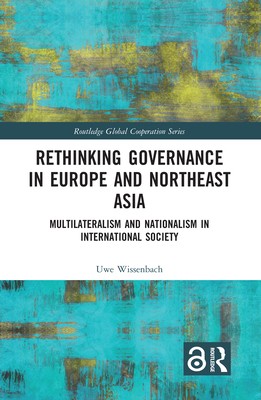
- We will send in 10–14 business days.
- Author: Uwe Wissenbach
- Publisher: Routledge
- ISBN-10: 0367321661
- ISBN-13: 9780367321666
- Format: 15.5 x 23.6 x 1.8 cm, kieti viršeliai
- Language: English
- SAVE -10% with code: EXTRA
Rethinking Governance in Europe and Northeast Asia (e-book) (used book) | bookbook.eu
Reviews
Description
This book explores how nationalism and multilateralism transform international society and global governance. It does so by comparing the governance model of the EU - a constitutionalised and increasingly polycentric form of multilateralism - with Northeast Asia. There nationalist administrations have resisted multilateral commitments and are locked into rivalries instead of pursuing a regional project.
Both Europe and Northeast Asia can be seen as success stories of the late 20th/ early 21st centuries, but by having followed different approaches to international governance. The book traces these two trajectories through critical junctures in history to how both regions have dealt with the contemporary challenges of the financial crisis and climate change. During the financial crisis, Europe's multilateral economic and monetary architecture revealed profound weaknesses whilst national policies allowed much of Northeast Asia to escape the worst of it. On climate change the European Union (EU) has developed effort-sharing governance models to reduce emissions, while Northeast Asian countries are relying on greening national industrial policy. The book argues that global governance has to find the balance between multilateralism and nationalism in order to find collaborative approaches to global challenges.
This book provides a fresh take on the EU and on Northeast Asia and develops innovative concepts of international society and polycentric governance. Thus, it will be of considerable interest to researchers and students of global governance, international relations, EU and Asia Studies.
EXTRA 10 % discount with code: EXTRA
The promotion ends in 23d.11:04:09
The discount code is valid when purchasing from 10 €. Discounts do not stack.
- Author: Uwe Wissenbach
- Publisher: Routledge
- ISBN-10: 0367321661
- ISBN-13: 9780367321666
- Format: 15.5 x 23.6 x 1.8 cm, kieti viršeliai
- Language: English English
This book explores how nationalism and multilateralism transform international society and global governance. It does so by comparing the governance model of the EU - a constitutionalised and increasingly polycentric form of multilateralism - with Northeast Asia. There nationalist administrations have resisted multilateral commitments and are locked into rivalries instead of pursuing a regional project.
Both Europe and Northeast Asia can be seen as success stories of the late 20th/ early 21st centuries, but by having followed different approaches to international governance. The book traces these two trajectories through critical junctures in history to how both regions have dealt with the contemporary challenges of the financial crisis and climate change. During the financial crisis, Europe's multilateral economic and monetary architecture revealed profound weaknesses whilst national policies allowed much of Northeast Asia to escape the worst of it. On climate change the European Union (EU) has developed effort-sharing governance models to reduce emissions, while Northeast Asian countries are relying on greening national industrial policy. The book argues that global governance has to find the balance between multilateralism and nationalism in order to find collaborative approaches to global challenges.
This book provides a fresh take on the EU and on Northeast Asia and develops innovative concepts of international society and polycentric governance. Thus, it will be of considerable interest to researchers and students of global governance, international relations, EU and Asia Studies.


Reviews